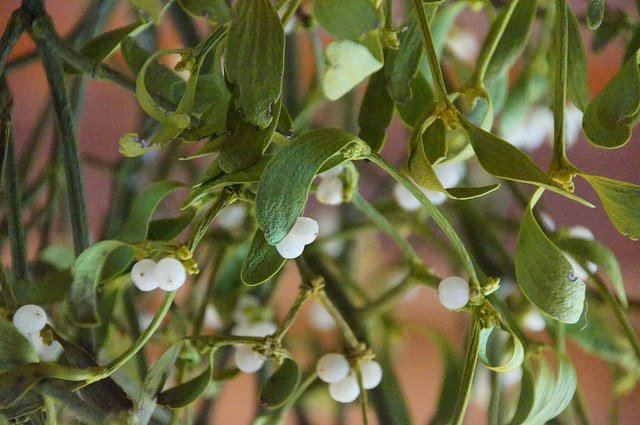Mistletoe
( )
)
Latin name:
Viscum album L.
Occurrence
As a semi-parasitic on deciduous trees.
Appearance:
The mistletoe is an evergreen, spherical shrub. From a short thick trunk grow green branches with evergreen foliage leaves, which sit at the top of the rung. In March and April, it is covered with yellowish-green flowers. The fruit forms a globular white berry with a sticky, slimy flesh.
Collection time:
winter months. If possible, the brittle mistletoe should be knocked down with long poles.
Drying:
The crushed plant is dried at room temperature under direct sunlight or even in the dark.
Active ingredients:
viscotoxin proteins A2, A3 and B, lectins, acetylcholine, histamine, ursolic acid, oleanolic acid, gamma-amino-lactic acid and a histamine-like protein fraction.
General information:
Mistletoe is an interesting and unusual plant. It has an unusual appearance, especially in late autumn and winter, when the trees are deprived. Among the Celts and Germans, the mistletoe always played a special religious role and has been used in different cults and ceremonies.
In the Middle Ages mistletoe branches were hanged in the house for protection from evil spirits and witches. Even nowadays this custom still remains vivid in some countries ,though in a different context, to put a mistletoe at Christmas time on the ceiling or above the front door.
The druids considered mistletoe to be a holy plant and a universal cure for all possible diseases.
Effects and applications:
Over the last decades, science has dealt extensively with mistletoe, and numerous studies have been carried out. It has been proven, that mistletoe can effectively help by hypertension. In addition, mistletoe has a calming effect on the central nervous system. This would explain the effect of mistletoe by anxiety and restlessness. There are also some cases of successful application of the plant by epilepsy and diabetes type 2.
Mistletoe is also used as a means to support the treatment of hypertension and associated problems, such as dizziness, headache, anxiety and cardiac disorders.
Preparation and dosage:
When using the drug, prepare a brew. 1 tablespoon of crushed mistletoe is poured over with a cup of boiling water and left to stand for about 20 minutes. This tea is is to be taken in the morning or 2 hours after breakfast.
WARNING! Some medical experts consider unprocessed mistletoe not safe for use. You should consult a physician before taking it.
DISCLAIMER
No part of this article should be considered health advice.
The author does not take any responsibility for your choices.
Using medicinal herbs is at your own risk.
Picture source
Under creative commons license